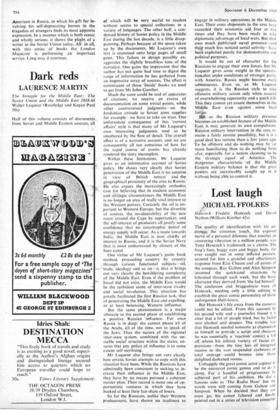Dark reds
LAURENCE MARTIN
The Struggle for the Middle East: The Soviet Union and the Middle East 1958-68 Walter Laqueur (Routledge and Kegan Paul 50s)
Half of this volume consists of documents. from Soviet and Middle Eastern sources, all
of which will be very useful to readers 'without access to special collections in a variety of languages. The other half, a con- densed history of Soviet policy in the Middle East during the last decade, is a little disap- pointing. Perhaps because of the space taken up by the documents, Mr Laqueur's own text is crammed onto large pages of small print. This failure in design possibly ex- aggerates the slightly breathless tone of the narrative. One gains the impression that the author has not quite had time to digest the range of information he has gathered from an impressive array of sources. The effect is reminiscent of those 'Inside' books we used to get from Mr John Gunther.
Much the same could be said of apparatus of citations; we receive an excess of documentation on some trivial points, while other controversial judgments—on the Jordanian attitude to Soviet arms supplies for example—we have to take on trust. One unfortunate consequence of this `current affairs' style is that many of Mr Laqueur's own interesting judgments tend - to be smothered by the flow of detail. The overall effect is of a narrative account, and we are consequently all too conscious of how far the rapid course of events has -already rendered the story incomplete.
Within these limitations, Mr Laqueur gives us an informative account .of Soviet policy. He shows very clearly that Soviet penetration of the Middle East is no surprise in view of British retreat and the geographical proximity of the area to Russia. He also argues the increasingly orthodox case for believing that in modern economic and strItegic circumstances the Middle East is no longer an area of really vital interest to the Western powers. Certainly the oil is im- portant to Western Europe. but the diversity of sources, the invulnerability of the new route around the Cape by supertanker, and the self-interest of producers all justify some confidence that no catastrophic denial of energy supply will occur. As a route towards India, the Middle East is now chiefly of interest to Russia, and it is the Soviet Navy that is most embarrassed by closure of the Suez canal.
One virtue of Mr Laqueur's guide book method, proceeding country by country . through various functional subjects—oil, trade, ideology and so on—is that it brings out very clearly the bewildering complexity of the Middle East. Even if the problem of Israel did not exist, the Middle East would be the turbulent scene of inter-state rivalry and social revolution. This situation has greatly facilitated the first Russian task, that of penetrating the Middle East and expelling, or at least balancing, Western influence.
But the same phenomenon is a major obstacle to the second phase of establishing a positive Russian influence. For once Russia is in deep; she cannot please all of the Arabs, all of the time, not to speak of the Jews. Thus the nature of the regional inter-state system, combined' with the un- stable social structure within the states, en- sures that any policy of influence is to some extent self-sterilising. • Mr Laqueur also brings out very clearly how erratic Soviet attempts to cope with this situation have been. While the Russians have admittedly been consistent in seeking to in- crease their influence in the Middle East, they have by no means pursued a coherent master plan. Their record is more one of op- portunistic ventures in which they have backed at least their fair share of losers.
So far the Russians, unlike their Western predecessors, have shown no readiness to engage in military operations in the Middle East. Their arms shipments to the area have exceeded their economic aid four or five times and they have been ready to take diplomatic advantage of local wars. But their own much publicised naval presence—and their much less noticed aerial activity—have been exploited purely for demonstrative and political purposes.
It would be out of character for the Russians to engage their own forces, but Mr Laqueur gives some weight to the specula- tionithat under conditions of strategic parity with America, Russia might become more adventurous. Even so, as Mr Laqueur suggests, it is 'the Russian style to take offensive military action only when assured of overwhelming superiority and a quick kill. This they cannot yet assure themselves in the Middle East even against some local forces.
ant as the Russian military presence becomes an established feature of the Middle East, it may generate its own compulsions. Russian military intervention in the area re- mains a fairly remote possibility, but it is a good deal less remote than a few years ago. To be offshore and do nothing may be tar more humiliating than to do nothing from afar, especially for a nation claiming to be the strategic equal of America. The dangerous characteristic 'of the Middle Eastern military balance is that the great powers are inextricably caught up in it without being able to control it.






































 Previous page
Previous page